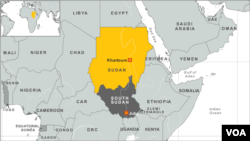JUBA, SOUTH SUDAN —
South Sudan's finance ministry on Wednesday proposed a new 17.3 billion South Sudanese pound budget, which increases funding for social programs and cuts security spending by 8 percent while maintaining it at half of the overall budget.
The new budget replaces an earlier one that was withdrawn in July after President Salva Kiir fired his entire cabinet.
Presenting the new budget, Finance Minister Agrey Tisa Sabuni said more resources have been allocated to social services, infrastructure development and promoting agriculture, but urged South Sudanese to "continue to live within our means."
Because of loan repayments, high macro-economic uncertainty, and other factors, including unreliable income from oil, monthly spending limits must remain at the austerity level of 555 million South Sudanese Pounds during the first six months of the fiscal year, Sabuni said.
"Recent events have shown that the continued flow of oil if is far from guaranteed," he said.
"Therefore, austerity measures will only be lifted once the government’s financial situation has improved.”
That could happen around January of next year when spending limits could be increased to 985 million pounds, he said.
Bashir Bandi, a member of parliament representing Marindi County in Western Equatoria State, said he supports spending half the budget on security.
“You cannot develop if there is no security. Through stability, you will be able to invest locally and you will be able to attract investors. Investors will not come to South Sudan if there is no security," he said.
The budget reflects the restructured, slimmed-down government, Sabuni said. Kiir cut the number of ministries from 31 to 21, while adding 10 deputy ministers.
Sabuni appealed to legislators to quickly approve the budget proposal, and member of parliament John Jok Chol, said he thinks they will.
“We will support him 100 percent. And there will be no problem and objection at all. The parliament will approve the budget,” he said.
It has 45 days to do so.
The new budget replaces an earlier one that was withdrawn in July after President Salva Kiir fired his entire cabinet.
Presenting the new budget, Finance Minister Agrey Tisa Sabuni said more resources have been allocated to social services, infrastructure development and promoting agriculture, but urged South Sudanese to "continue to live within our means."
Because of loan repayments, high macro-economic uncertainty, and other factors, including unreliable income from oil, monthly spending limits must remain at the austerity level of 555 million South Sudanese Pounds during the first six months of the fiscal year, Sabuni said.
"Recent events have shown that the continued flow of oil if is far from guaranteed," he said.
"Therefore, austerity measures will only be lifted once the government’s financial situation has improved.”
That could happen around January of next year when spending limits could be increased to 985 million pounds, he said.
Bashir Bandi, a member of parliament representing Marindi County in Western Equatoria State, said he supports spending half the budget on security.
“You cannot develop if there is no security. Through stability, you will be able to invest locally and you will be able to attract investors. Investors will not come to South Sudan if there is no security," he said.
The budget reflects the restructured, slimmed-down government, Sabuni said. Kiir cut the number of ministries from 31 to 21, while adding 10 deputy ministers.
Sabuni appealed to legislators to quickly approve the budget proposal, and member of parliament John Jok Chol, said he thinks they will.
“We will support him 100 percent. And there will be no problem and objection at all. The parliament will approve the budget,” he said.
It has 45 days to do so.




